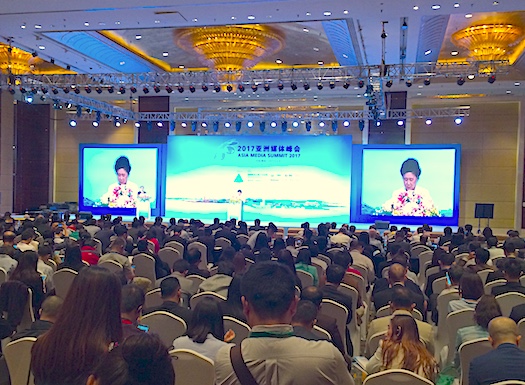The 2017 Asia Media Summit was opened this morning by the Vice Premier Madam Liu Yandong (pictured), in Qingdao China.
A packed audience of delegates heard Ms Liu outline China’s achievements and its commitment to Asia and the rest of the world.
The summit is organised by the Asia Pacific Institute for Broadcasting Development.
AIBD Director Chang Jin welcomed delegates from across Asia and the Pacific to this year’s top level summit, including communications ministers from various countries.
In a session exploring how media can shape the development agenda, a range of speakers discussed media’s role in topics from conflict resolution, to sustainable cities, climate change and health.
All India Radio’s Amlanjyoti Mazumdar told delegates how AIR helped improve vaccination compliance in India by a program of messages that countered the objection and fears of people about immunization. Due to the messages polio and smallpox have now been eradicated in India. Radio also plays a big role in educating farmers to help them improve their farming practices.
Deputy Director of CGTN’s English network, Li Bin said media has a social responsibility to inform the public and become a reliable source of information. “Media should be true, accurate and balanced… Chinese media is trying to make itself a reliable source of information.”
He said new media “has become a platform to reflect public opinion. We should take the most of this advantage, but it should not be used for fake news. Journalists have a big role to find the truth behind events.” (see related report)
Bhutan Broadcasting Service manager Tshering Wangchuk (pictured above) briefed delegates the Bhutan National broadcaster’s need to find more of its own revenue (half comes from government) and also the need to collaborate with other broadcasters to build a thriving media sector. BBS has two radio and two television networks.
Samoa’s Communications Minister Lepuiai Rico Tupai (pictured below) asked for help from the world’s media to educate people about climate change and urge governments to take action on it.
“The Pacific is the biggest part of the world affected by climate change. Media has a big role to play in helping us in climate change goals in light of President Trump pulling the USA out of the Paris Agreement environment goals.
“140 people died from the Tsunami in Samoa, many others in Fiji and other pacific islands. These are stories that Trump needs to know. There are a lot of stories that need to be told for the benefit of our small islands in the pacific,” said Minister Tupai.
In Samoa, the Prime MInister does regular weekly radio programs to keep the public informed about what the government is doing and to hear from them about what is needed from government. “This has increased the government’s popularity and also helped us make policies for the good of the people,” he said.
The President of the Communications University of China, Prof Zhengrong Hu (pictured below) said “China is a media saturated society” and the development of the country has been helped significantly by media.
In China, radio reaches 98.7% of the population, television reaches 98% and internet reaches 53% of people.
“The media has helped us to promote policies, inform and educate the public and unite society by appealing to national and cultural traditions…
“Now in the era of new media it has developed very quickly. The media has helped us transform Chinese society,” he said.
In a later session, media CEOs also addressed the subject of poverty and the UN’s Sustainability Goals.
UNDP’s Valerie Cliff says the UN has supported community radio for development programs in Laos since 2006. There are now 8 community radio stations reaching more than 200,000 people across provinces that did not previously have such access to media. “This is helping us achieve the UN Development Goals,” she said.
Rajeev Singh CEO of Prasar Bharati asked those who are ahead to look back at those who are behind. “They ask you to sacrifice some of your needs for the good of other humans, your children and your planet,” he said.
“The idea that we are doing charity is wong. we are together trying to save the planet from conflict and problems, so all helping hands are welcome. Charity along will not suffice.
“Media plays a small but important part in this. It is a collaborative endeavour.”
Jailani Joharim the Deputy Communications Minister in Malaysia said his country is committed to the sustainability goals through a national plan. “Malaysia has taken a collaborative approach to realise the future we want… Our media doubles and triples the effect of all our other actions…
“The media need to balance ethics, social responsibility and the bottom line. They must hold themselves to high standards of journalism,” he said.
Aditya Ray, CEO Maharaja TV Sri Lanka said, “traditionally media is known for providing news, information and advertisements. It is powerful and can shape the opinions of people… Media is as much a part of our daily lives as religion, so we need to use our media to support the sustainable development goals.”

